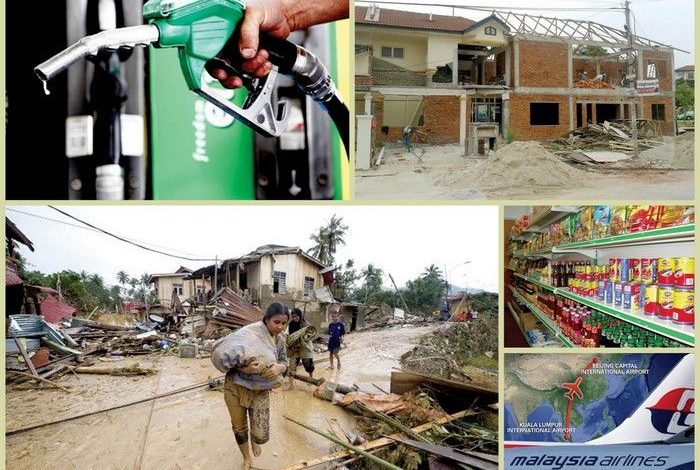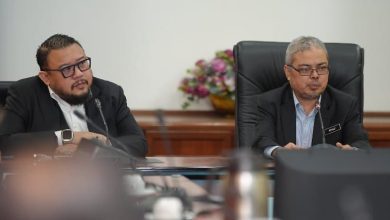

Cover Story
By Fathol Zaman Bukhari
Year 2014 has been a tumultuous year for Malaysians, as the country suffered one calamity after another. Topping the list was Malaysian Airlines Flight MH 370 which went missing along with its 239 passengers and crew on March 8, 2014. Before the dust could even settle, another of the carrier’s Boeing 777 was shot down over Ukraine. Some 298 innocent lives were lost. The people behind the downing of Malaysian Airlines Flight MH 17 on July 17, 2014 have yet to be identified.


Lingering fear of price hikes exacerbated by GST, limited job opportunities and poor remuneration packages
As Malaysians were readying themselves for the onslaught of the year-end monsoon season, tragedy once again struck the nation. It was another airline disaster, the third in a row. This time it was an Airbus belonging to the world’s foremost low-cost carrier whose owner, Tony Fernandes, had proudly proclaimed that his airline’s safety record was “impeccable”.
AirAsia Flight QZ8501 went off the radar screen while on its way to Singapore from Surabaya, Indonesia on the morning of Sunday, December 28, 2014. All 162 passengers and crew on board the aircraft were killed when it crashed into the Java Sea following an attempt by the pilot to overcome bad weather in its path.
The loss of the three aircraft is being tagged as the nation’s worst tragedy of 2014. We, as a nation, will take a long time to recover from these setbacks. Within a space of 10 months we had lost three state-of-the art passenger planes and a total of 699 innocent lives. Although the majority of the casualties were foreigners and not Malaysians, the fact that the planes were Malaysian-owned speaks volume of our capability, professionalism and preparedness.
While the search for the missing Airbus was going on in the choppy Java Sea, the nation’s worst flooding in recorded history took centre stage. No states were spared, not even Perak whose leaders had once proclaimed that flooding was a thing of the past when Temenggor Dam began operating in 1976.
Over 50,000 people were evacuated as flood waters inundated towns, villages and settlements bordering rivers. In Perak some 5000 victims were moved to relief centres while rescue efforts were underway. At Kampong Gajah, a child was swept away by the rising water on New Year’s eve. This was the only known casualty in the state. Overall, 21 deaths were recorded in the two weeks of carnage beginning on December 15, 2014 till January 3, 2015.
Although leaders are fond of blaming God for the deluge, this time around they cannot pin the blame squarely on the Almighty, as they are equally complicit. Massive deforestation is the primary cause. Years of unfettered clearing of timber-rich jungles, especially in Belum, Lojing and Cameron Highlands, has exposed the populace to this calamity.
Yet in spite of this being an annual occurrence, little has been done to mitigate flooding like what is done in the developed regions of the world. We never seem to learn from our mistakes. This “tidak apa” attitude will get us into greater trouble in future.
The above events are not aimed at exposing the faults and misdeeds of our “venerated” leaders. They are merely a preamble to our cover on Year 2015.
In dealing with the subject matter the views of a cross-section of Ipohites are taken as a plausible way to gauge their hopes and aspirations for the New Year. Hopefully, the input these selected few proffered, will provide an interesting insight into the thinking of Ipohites in general.
The Professionals


Marketing manager Audrey Lourdes, 34, lawyer Kenny Lai, 38, and eye surgeon Dr Lee Mun Wai, 40, all felt the effects of inflation, particularly after each round of petrol price hike. For Kenny, the financial implication was the greatest as he had started a family, bought a house and had it renovated. “Property prices keep soaring and owning a house today is difficult,” said Audrey.


He was of the opinion that Budget 2015 is of no help to middle-income earners. “We don’t get much relief and incentives. Ironically, we’re the ones who pay the most taxes.”
As for Dr Lee, who is in private practice, the thing that concerns him the most is the impending GST and its impact. He intimated, “Medical practitioners have been in limbo as till now, there are no clear guidelines on how we will be affected and how much our costs will escalate.”
Both Audrey and Kenny felt that 2014 could have been better, although they are not complaining. On the other hand, Dr Lee seemed to have had one busy year, with speaking engagements around the country, as well as internationally. “I attended numerous conferences to get myself updated on the rapidly changing world of medicine. In fact, I just returned from India for an eye conference, where I also ran a teaching course and conducted live surgery during the conference,” he revealed.
While Ipoh seemed more vibrant compared to a year or two ago, Audrey lamented that the standard of cleanliness is still lacking. She said, “It boils down to the people’s attitude when it comes to keeping the city clean.”
Ipoh’s growth is debatable. While Dr Lee, having returned to Ipoh five years ago after more than two decades abroad, welcomed the sprout of designer cafes that cater to the Western palate, Kenny felt that the city could improve further if the airport is better utilised by commercial airlines. All three hoped for a cleaner, greener, better and safer Ipoh. “I’d like things to be more affordable,” Audrey interjected.
The more politically savvy Kenny, however, would like to see an inclusive society where citizens are not identified by race or religion, and particularly for a government that works for the rakyat.
Professionally, Dr Lee hoped that people’s perception about the standard of eye care in Ipoh will change as the expertise available here is top notch, comparable with the best in the world.
The Middle-income Earners
Those were the views of professionals who had made a mark for themselves in the city. But what about those who are either self-employed or are eking out an honest living to feed their families? A chance encounter with three middle-aged Malay gentlemen at ‘Sabar Menanti’, a popular eatery near Stadium Perak, set the ball rolling.
Khairul Al-Azhar, 40, a small-time contractor from Meru is worried sick about the impending GST fearing it would have an impact on his livelihood. Khairul feels his contracting jobs will be affected with the escalating cost of building materials. “My clients are already complaining now what more when GST is imposed,” he lamented.






The existence of a huge pool of unemployed graduates is a cause for concern for Murad Pandak Aman, 45, a factory supervisor from Manjoi. “I hope more job opportunities are created so these youths can gain employment. This responsibility should be shared equally by the government and the private sector,” he stressed.
Fuel price hike seems to be a popular issue with many and Zainuddin Hassan, 44, a civil servant from Batu Gajah was no exception. “Although the price of fuel has gone down the prices of goods and services haven’t. I find this disturbing,” he protested.
The Twenty-something


I spoke to two such individuals and felt so sorry for them. But what am I to do, as that is the general situation in the country.
Ismail Saad, 23, is a wedding photographer and works at a photo studio in Bandar Baru Tambun. He is a diploma holder and makes about RM1500 a month. “It’s barely enough to survive on. After paying my car installment and house rent, I have little left to spend. I feel I am being underpaid for my expertise,” he declared.
Kumar, 24, works as a waiter at one of the city’s prominent social clubs. A bachelor, he lives with his parents in Silibin. “I’ve a degree in hotel and catering but have yet to do what I am trained for. Nonetheless, I am happy to have a job unlike many of my friends,” he exclaimed. Kumar makes about RM1400 a month. But he is not complaining.
Conclusion
In conclusion, the hopes and aspirations of these eight individuals, who represent a cross-section of Ipohites, are almost identical. All have a lingering fear of price hikes which will be exacerbated by the upcoming GST, limited job opportunities and, above all, poor remuneration packages.
The political undercurrent pervading in the country, social inequality, relationship between races, religious bigotry and the widening gap between the rich and the poor are some of my major worries. If and unless these problems are addressed holistically, the results may be more catastrophic than the tragedies of MH 370, MH 17 and AirAsia Flight QZ8501 combined.
The emergence of the Eminent 25 is like a breath of fresh air. But will this group of Malay intellectuals, led by Dato’ Noor Faridah Ariffin, a lawyer and former diplomat, make an impact on the social landscape? I hope they will. And that is my one and only wish for 2015.


